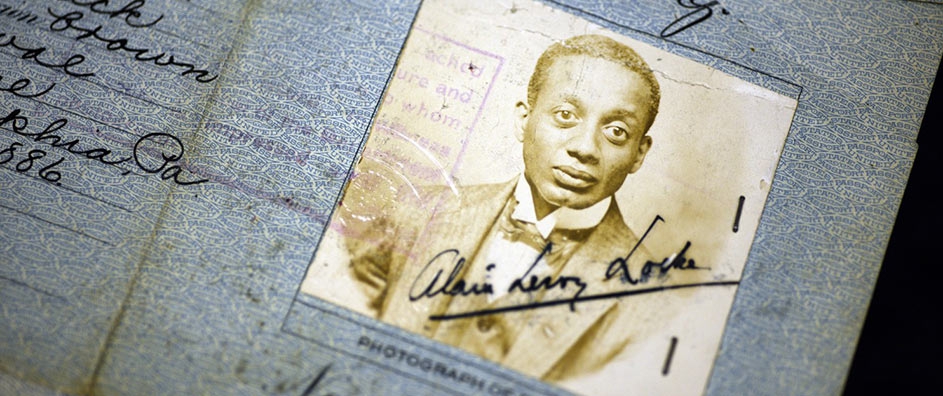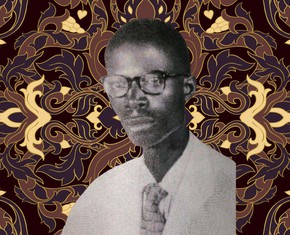The views expressed in our content reflect individual perspectives and do not represent the authoritative views of the Baha'i Faith.
It took me a few years, but I finally discovered the night when Alain Locke met Shoghi Effendi, the Guardian of the Baha’i Faith, in the Holy Land: Thursday, November 29, 1923.
You have to wonder: What did the most revered African American genius of his time think about his initial visit to the Baha’i World Centre? How did he react when he met the head of his Faith?
We know precious little about Locke’s experience in Haifa, Palestine, save for his richly descriptive article, “Impressions of Haifa,” first published in Star of the West (1924), and reprinted in the first three volumes (1926, 1929, 1930) of The Baha’i World. Since The Baha’i World volumes were often given to government leaders and were eventually carried by public and university libraries, Alain Locke was publicly identified as a Baha’i as early as 1924.
Alain Locke took “pilgrim’s notes” of his evening visit with Shoghi Effendi, at which other Baha’i pilgrims, as well as individuals residing in Haifa at that time, were no doubt present. Locke’s notes (to the best of my ability to accurately read his handwriting) are as follows:
Diary of Evening Talk with Shoghi Effendi
Thursday, Nov. 29, 1923
From here only
All the horizons of the world are luminous —
Mt. Carmel.
Mount of a sublime vision of a regenerated humanity and a paradise on Earth.
Baha’ism, in a practical way, revives the millennial life — an era of peace and goodwill and mutual understanding on Earth —
Corrects that pathetic otherworldliness which has crept into institutional Christianity and corroded the dreams of social reform which gave Puritan Christianity its sense of mission, its righteous indignation, its grand moral momentum and pretension of reform.
On the other side of that same sheet of paper (or perhaps on a second sheet), Locke continues to record the discourses of Shoghi Effendi:
Progressive revelation
Relativity of morals
Islamic Dispensation, unlawful to take interest on money – Baha’i dispensation repeals this.
“Apparently He [God, revealed through Baha’u’llah] ordereth whatsoever way He willeth and He makes interest on money lawful even as He had formerly made it unlawful.”
At the end this double-sided document, Locke apparently makes a later diary entry that reads as follows:
Monday, December 3, Excursion to Haifa
Describe this
Luncheon
Mt. Carmel
Pomegranates
Water Wheel
These notes, obviously scanty and impressionistic, only recorded Locke’s innermost thoughts in his own personal shorthand.
Another archival document that I discovered makes it clear that Alain Locke wrote down some passages from the Writings of Baha’u’llah. I will provide the authorized translations of those very same passages, which may indicate those excerpts from Baha’i scripture that most impressed Alain Locke that time. The first five quotations come from Baha’u’llah’s “Words of Paradise:”
…valiant souls as have passed beyond the sea of names and pitched their tents upon the shores of the ocean of detachment. – Baha’u’llah, Tablets of Baha’u’llah Revealed After the Kitab-i-Aqdas, p. 58.
Locke writes that [Baha’u’llah] “charges Sufis (mystics) with negation, idleness and superstition,” and then quotes this passage: “These mortal men have evidently set aside the differences of station and have come to regard themselves as God, [while God is immeasurably exalted above all things.]” – Baha’u’llah, Ibid., p. 58.
The ocean of divine wisdom surgeth within this exalted word, while the books of the world cannot contain its inner significance. – Baha’u’llah, Ibid., p. 60.
Verily I say, whatever is sent down from the heaven of the Will of God is the means for the establishment of order in the world and the instrument for promoting unity and fellowship among its peoples. – Baha’u’llah, Ibid., p. 60.
The word of God which the Supreme Pen hath recorded on the seventh leaf of the Most Exalted Paradise is this: O ye men of wisdom among nations! Shut your eyes to estrangement, then fix your gaze upon unity. Cleave tenaciously unto that which will lead to the well-being and tranquillity of all mankind. This span of earth is but one homeland and one habitation. It behoveth you to abandon vainglory which causeth alienation and to set your hearts on whatever will ensure harmony. In the estimation of the people of Bahá man’s glory lieth in his knowledge, his upright conduct, his praiseworthy character, his wisdom, and not in his nationality or rank. O people of the earth! Appreciate the value of this heavenly word. Indeed it may be likened unto a ship for the ocean of knowledge and a shining luminary for the realm of perception. – Baha’u’llah, Ibid., pp. 67–68.
Locke then writes down four passages from Baha’u’llah’s “Tablet of the World”:
O people of God! I admonish you to observe courtesy, for above all else it is the prince of virtues. Well is it with him who is illumined with the light of courtesy and is attired with the vesture of uprightness. Whoso is endued with courtesy hath indeed attained a sublime station. – Baha’u’llah, Tablets of Baha’u’llah Revealed After the Kitab-i-Aqdas, p. 88.
Mankind in its entirety must firmly adhere to whatsoever hath been revealed and vouchsafed unto it. Then and only then will it attain unto true liberty. – Baha’u’llah, Ibid., p. 89.
O people of God! Give ear unto that which, if heeded, will ensure the freedom, well-being, tranquillity, exaltation and advancement of all men. – Baha’u’llah, Ibid., p. 92.
There they should hold fast to the cord of consultation [and adopt and enforce that which is conducive to the security, prosperity, wealth and tranquillity of the people.] – Baha’u’llah, Ibid., pp. 92–93.
Locke then notes:
“(plea for representative gov. [government].)”
If Alain Locke—an authentic genius and the most educated African American of his generation— was impressed by these words of Baha’u’llah, then perhaps you and I should take more than a passing interest in these universal sacred texts as well.
Although his actual notes rely on an earlier translations of Baha’u’llah’s “Words of Paradise” and “Tablet of the World,” it’s my hope that readers will be curious enough to read these celebrated Tablets of Baha’u’llah in full. Their depth and wisdom, as Locke recognized, have enormous importance for the world.
















Comments
Sign in or create an account
Continue with Googleor